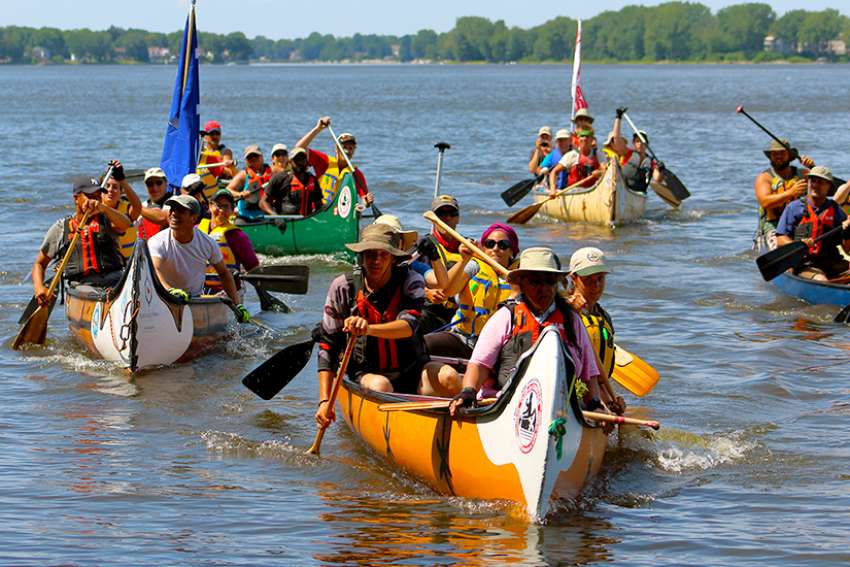Jesuit and indigenous pilgrims arriving in Kahnawake on August 15, an Indian reserve in Montreal. They reach the end of their 540-mile canoe trip, following a route used by 17th-century missionaries, in an effort to promote reconciliation.
CNS photo/Francois Gloutnay
As bishops ponder Pope Francis visit to Canada, Indigenous relations are a priority
By Deborah Gyapong, Canadian Catholic News
OTTAWA – Regardless of whether Pope Francis comes to Canada, Indigenous relations remain a top priority to the bishops, said the newly-elected president of the Canadian bishops’ conference.
Bishop Lionel Gendron of Saint-Jean-Lonueuil, Que., elected Canadian Conference of Catholic Bishops (CCCB) president Sept. 29, said a possible papal visit was not a major topic at the bishops’ recent plenary gathering, but reconciliation remains high on the agenda.
The Truth and Reconciliation Commission (TRC) helped us to “better discover the sufferings of First Nations people,” through the residential schools, Gendron said.
Though the TRC had 94 Calls to Action, including a demand the Pope apologize on Canadian soil for Church involvement in residential schools, Gendron said the bishops’ response “is not a response to the TRC,” and “not a response to the politicians,” but “our response comes from the Gospel, and comes from our mission.”
Putting that mission first represents a change, he said.
“We were discussing so many things not according to the Gospel and (our) mission as bishops,” Gendron said.
Regarding a papal visit, Gendron said the bishops are in a process of “accompaniment and discernment” to find out what the “Spirit is asking of us at this moment” from a “pastoral point of view,” he said.
“If the Pope wants to come, we will welcome him,” Gendron said. “Our way of interpreting him, Pope Francis would accept (and) if at some point we see that it is important, we might as well say, ‘Holy Father, if you wish to come...”
According to outgoing CCCB president Douglas Crosby, papal visits are very expensive. Discussions about a possible visit are ongoing with various levels of government and other agencies.
Archbishop Donald Bolen of Regina said he is pleased with the direction the CCCB is taking. The Saskatchewan bishops have supported the idea of extending an invitation to the Pope.
“I think the conference is engaging as deeply as ever in its history with Indigenous relations,” Bolen said.
“It’s a priority. It occupies our time and energy and we’re making steps together.
“I don’t know that I could have said that a year ago,” he added.
Bolen, who was in Ottawa Sept. 29 to receive the Alumnus of the Year award from Saint Paul University, drew the attention of Pope Francis last spring, according to the Apostolic Nuncio to Canada.
Archbishop Luigi Bonazzi told a reception held in Bolen’s honour that, during his annual half hour audience with the Holy Father last June, Pope Francis mentioned a young bishop who had spoken “in a clear, luminous way” about the importance of reconciliation with Canada’s Indigenous peoples during the Western bishops’ visit to the Vatican.
When Bonazzi suggested he must be referring to Archbishop Bolen of Regina, the Pope replied: “A very good bishop!”
While indigenous relations and reconciliation remain a “major priority” for the bishops, the matter of a papal visit will “unfold in discussions over time,” Bolen said. “Our focus isn’t reduced to the role of Pope Francis.”
Instead, the CCCB is “investing, time, energy, commitment” and resources to reconciliation, although it is yet to be determined exactly “what shape that takes,” he said.
One area of focus is supporting the six dioceses of Canada’s North that used to be missionary dioceses under the Vatican Congregation for the Evangelization of Peoples but are now normal dioceses.
“Because of the transfer... we are building relationships with these northern dioceses and their peoples on a level that has never happened before and that’s a beautiful thing,” Bolen said. “In my diocese and every diocese, good discussions are going on on what it means to be in relationship, or be a twin with a diocese or part of a diocese,” he said. “I think there’s some excitement about this.”
Bolen is planning a visit to Inuvik.
“For me, like many bishops, the North is kind of a new territory for me, I haven’t spent a lot of time thinking about the North,” he said.
During the plenary, several bishops spoke in solidarity with the northern dioceses, and explored ways of twinning dioceses or parts of dioceses.
Please support The Catholic Register
Unlike many media companies, The Catholic Register has never charged readers for access to the news and information on our website. We want to keep our award-winning journalism as widely available as possible. But we need your help.
For more than 125 years, The Register has been a trusted source of faith-based journalism. By making even a small donation you help ensure our future as an important voice in the Catholic Church. If you support the mission of Catholic journalism, please donate today. Thank you.
DONATE

